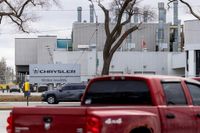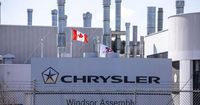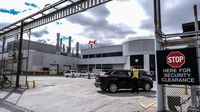Stellantis Windsor Assembly Plant is set to shut down for two weeks starting April 7, 2025, in response to recently announced U.S. tariffs on imported vehicles. This decision comes directly after U.S. President Donald Trump confirmed a 25 percent tariff on all foreign-made automobiles, which took effect at midnight on April 2, 2025. According to Unifor Local 444, the union representing the workers at the plant, the shutdown is a necessary move as the company navigates the uncertainty created by these tariffs.
In a Facebook post, Unifor Local 444 stated, "This has and continues to create uncertainty across the entire auto industry. This is not just affecting our plant—it’s impacting facilities in the U.S. and Mexico as well." The Windsor plant, which employs approximately 3,600 workers, primarily manufactures the Chrysler Pacifica minivan, Chrysler Grand Caravan, and Dodge Charger Daytona.
Stellantis spokesperson LouAnn Gosselin confirmed the shutdown, stating that the company is "temporarily pausing production" and is set to resume operations the week of April 21. Gosselin noted that around 3,200 employees in Canada would be affected by this decision. She added, "Immediate actions we must take include temporarily pausing production at some of our Canadian and Mexican assembly plants, which will have an impact on several of our U.S. powertrain and stamping facilities that support those operations." This indicates a broader impact across Stellantis's North American operations.
The announcement of the tariffs came alongside a broader strategy from the Trump administration to bolster domestic manufacturing. However, experts have raised concerns about the potential inflationary effects of these tariffs, which could ultimately lead to reduced car sales and production. Jonathan Smoke, chief economist at U.S. consultancy Cox Automotive, expressed skepticism about the immediate benefits of the tariffs, stating, "The current state of the global automotive market has been more than six decades in the making. Change won’t happen overnight, nor will it happen in just a few years. The evolution will be slow and difficult, and in the near term, we expect vehicle sales to fall, new and used prices to increase, and some models to be eliminated if tariffs persist."
Stellantis is also facing challenges at its Brampton Assembly Plant, where production of the next-generation electrified Jeep Compass SUV has been paused since early 2024. The Brampton plant had around 3,000 employees before its closure, and Unifor President Lana Payne has expressed concern about the ripple effects this delay will have on local parts suppliers tied to vehicle production.
As part of the same tariff response, Stellantis announced it would temporarily lay off 900 workers at five U.S. facilities, including plants in Michigan and Indiana that supply components for the Windsor and Brampton plants. This highlights the interconnected nature of the automotive supply chain across North America, where disruptions in one area can lead to significant impacts elsewhere.
Ontario Premier Doug Ford commented on the situation, acknowledging the need for Canada to respond to the tariffs but remaining hopeful that the shutdown would be brief. He stated, "My opinion, we need to respond. But let’s pray it’s only a couple weeks that they have to close." This sentiment reflects a broader concern among Canadian officials regarding the ongoing trade tensions and their potential to disrupt local economies.
Industry experts have warned that the fallout from these tariffs could be severe. Flavio Volpe, head of the Automotive Parts Manufacturers’ Association, noted that the shutdowns would affect numerous companies in Ontario and Michigan that supply parts to the assembly plants. He remarked, "I’m not surprised. I also am absolutely unhappy about it," suggesting that layoffs at these suppliers may soon follow.
The tariffs have sparked a wave of uncertainty across the auto industry, with many companies now reevaluating their production strategies in light of the new economic landscape. While Canada has avoided additional tariffs for now, the automotive tariffs announced by Trump are expected to significantly impact the value of non-American content in vehicles.
As Stellantis prepares to navigate these turbulent waters, the company has emphasized its commitment to engaging with the U.S. administration to address the implications of the tariffs. In an email to employees, Antonio Filosa, the company’s chief operating officer for the Americas, stated, "We are continuing to assess the medium- and long-term effects of these tariffs on our operations, but also have decided to take some immediate actions, including temporarily pausing production at some of our Canadian and Mexican assembly plants. Those actions will impact some employees at several of our U.S. powertrain and stamping facilities that support those operations."
The Windsor Assembly Plant’s shutdown is just one of many adjustments being made across the automotive sector as companies react to evolving trade policies. As the situation develops, workers, suppliers, and consumers alike will be closely watching the impacts of these tariffs and the broader implications for the North American auto industry.








